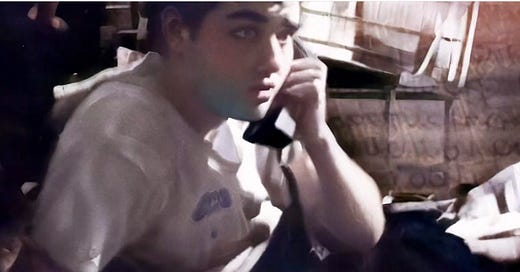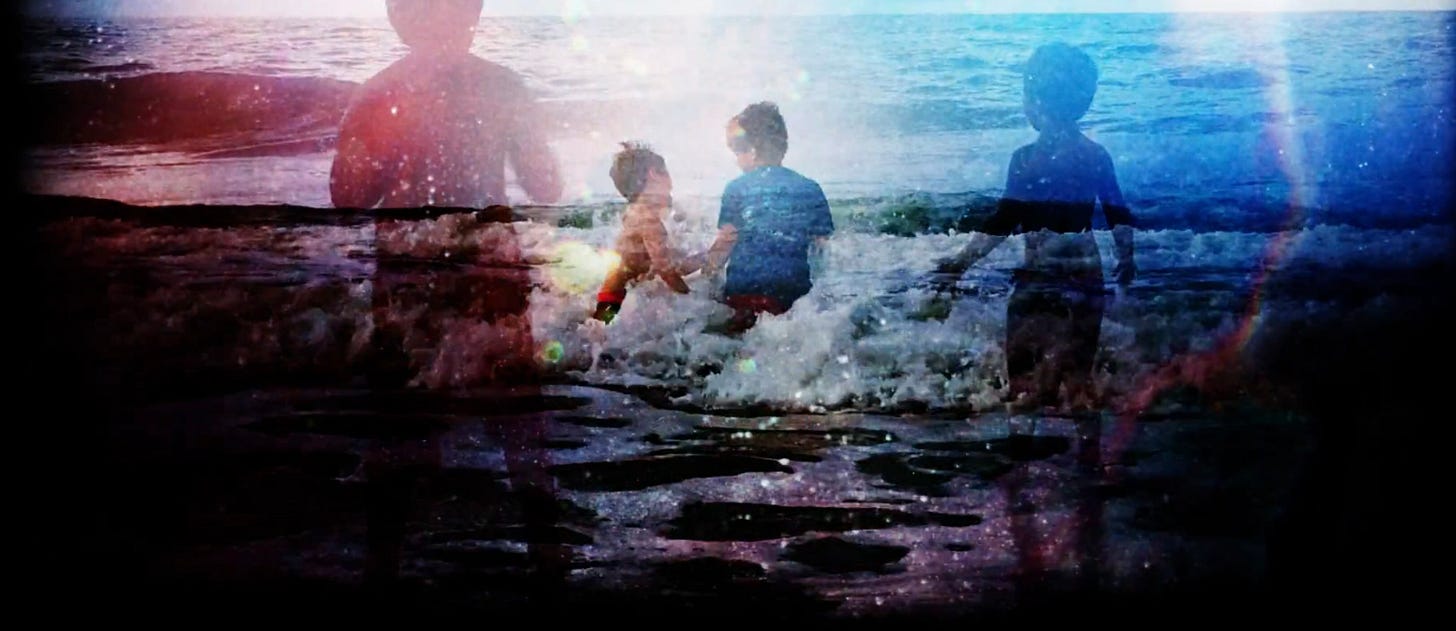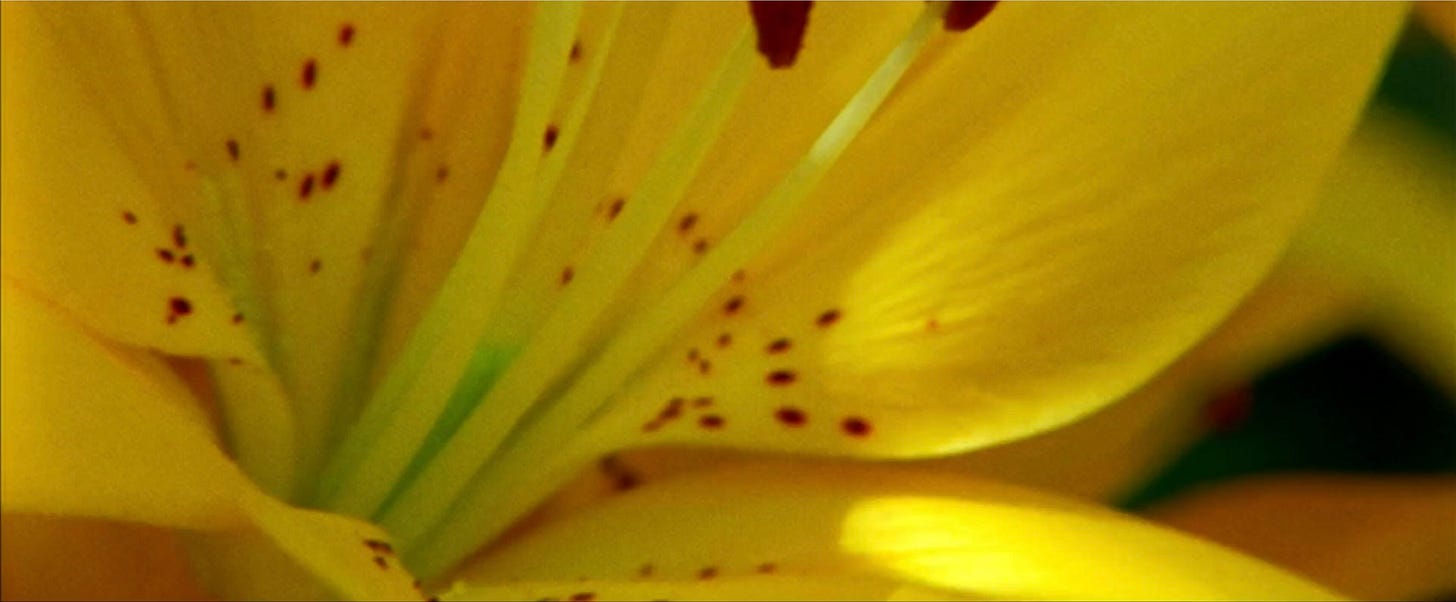David Baeumler's 60 Second Thoughts series is an exploration of what can be expressed in one minute's duration. Baeumler, grouping these shorts into volumes of three, began the series as an experimental riff on the format of TV ads. Long-time Baeumler collaborator Kevin Silva provides the consistently excellent narration, and Silva's ability to nail down the tone of advertising voice-overs is undoubtedly part of Baeumler's original impulse.
The earliest shorts in the series (actually even more compressed, into 30 Second Thoughts) played with using the language of TV ads to "sell" ambiguous and poetic perceptions of everyday life. Baeumler derived considerable ironic humor from the tension between the advertising format and the mixed messages of alienation and rage which formed much of the content. Now, in Volume Three, he has expanded the scope of the project beyond ad satires to a more general exploration of the different kinds of poetic epiphanies and insights which are particularly well-suited to the one minute form.
Box of Letters is a meditation on an old box of letters which Baeumler has carried with him from apartment to apartment as he goes through his adult life, and what is gained, and what is lost, as technology has changed the nature of correspondence from the physical, hand-written media of his youth to the disembodied quality of contemporary communication. Silva informs us that “Your children will have texts and posts and clouds of data.” We watch a collage of home videos from Baeumler's past, blended and textured with old hand-written letters. In a contrasting sequence, we see his two young sons, absorbed in their phones and computers. The one minute format doesn't attempt to make any definitive, analytical statement on this cultural shift, but is more like a short lyrical poem, focusing on the powerfully evocative quality of dusty old letters, which bring back memories as much through their smell, their physical texture, their handwriting, as through the verbal content.
The title of Two Suns itself is a poetic pun, comparing Baeumler's experience as a father of two sons to living on a planet with two suns, a universe in which two bright spheres of energy compete for his attention, admiration, and love. Silva speaks the narration with the folksy diction and accent of an old-fashioned tale of the Wild West. He tells a vaguely science-fictiony story of a planet where the inhabitants discover that that their sun is really a binary star, while we watch a montage of footage of the two boys, in a playground, running on the beach, often with the sun in the background. “You'd think they'd crash into each other, sure, you know how two magnets push against each other, just so?” This is typical of the narration's metaphorical language describing the family dynamics generated by the brothers. There are no explicit shots of the brothers fighting, or cuddling, but rather constantly in orbit around each other, constantly exchanging energy. The overall impression is that the introduction of a new child into the family, with a new energy pattern, new needs, new ways of expressing himself, complicates the family dynamics in a way that Baeumler finds comparable to the discovery of a second sun in the sky of his domestic planet. As the father, he finds this new complication to be dazzling and delightful with its increased challenges and opportunities.
Winter Thaw is the most abstractly poetic of the three. The narration begins with the assertion that “animals keep all the seasons within them throughout the year to stave off despair.” The montage, in deep alluring colors of green, yellow, fuchsia, blue, blends close-ups of swimming guppies, sunbathing bears, gorgeous flowers. The colors emphasize the constant, kaleidoscopic changes of the seasons. The accompanying poem suggests that these constant changes can cause dangerous emotional upheavals, and that the different qualities of winter, spring, summer and fall can be distilled and internalized, providing a kind of inner stability. By implication, it's a meditation on change, memory, and the paradox of living trapped within the dimension of time. Baeumler skillfully allows the poetry of the images and the words play off of one another, amplifying and enriching the metaphors.
As Baeumler continues to explore the one minute format, he keeps expanding into new territory. The latest volume, by moving beyond the satirical impulse of the first films in the series, retains the overall structure of voice-over-plus-montage which is familiar from perfume and pharmaceutical ads, and he pushes it into the realm of short lyric poetry, of filmed haiku. Where will he go next? Whether he continues to explore one minute films, or else moves into a new format, I have come to rely on Baeumler, over the years, for his consistent ability to combine his lovely and precise use of language and his fine-tuned, flexible visual palette, making films which delight and surprise me with their quirky sensibility and poetic power.
My articles on experimental film are freely available to all, but are supported by monthly and annual donations from readers. Please consider becoming a paid subscriber to support my work. Thank you.






